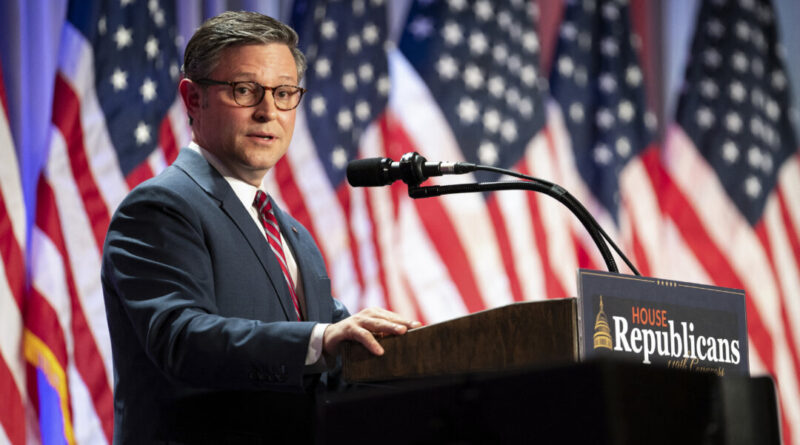Johnson and Trump to Discuss Strategy for Accelerating GOP Agenda
Republicans are expressing their intentions to introduce comprehensive legislation focused on border security, energy policy, and tax reform in the near future.
WASHINGTON—House Speaker Mike Johnson (R-La.) announced that he and President-elect Donald Trump are collaborating on strategies for the first 100 days of the forthcoming Republican-led administration.
“I’ve been in daily discussions with the incoming White House… President-elect Trump and I will delve into this matter extensively this weekend ahead of the Army-Navy game,” Johnson stated during a press conference on Dec. 10.
He was referring to the imminent football match set for Dec. 14 between the two military academy rivals at Northwest Stadium in Landover, Maryland, which both Trump and Johnson are slated to attend.
Trump’s team has indicated their aim to pass significant legislative reforms concerning issues such as border security, energy policy, and tax reform shortly after Trump’s inauguration.
According to Johnson, Republicans are prepared to begin implementing “an America First agenda… right from the beginning” following the transition of power in January.
This would involve a “very aggressive first 100 days agenda,” Johnson mentioned, alluding to the “proverbial playbook” that Republicans have been formulating for over a year to expedite legislation.
Johnson did not specify how the leadership would manage their slender majority in the House, which could fall to as few as 217 seats—below the majority threshold for the full House—due to resignations from Trump’s appointees in the early weeks of the 119th Congress.
This slim majority still provides Republicans a slight advantage over Democrats, necessitating near-unanimous GOP backing for any proposed legislation.
The situation is more favorable in the Senate, where Republicans hold a more stable 53-seat majority compared to the Democrats’ 47 seats.
Typically, extensive legislative changes on contentious issues face delays in the Senate, as most bills require a 60-vote majority for final passage, leading to historical deadlock on significant legislation.
Nonetheless, the budget reconciliation process offers a compelling alternative.
Through budget reconciliation, legislation directly tied to federal spending and revenue can bypass the Senate’s 60-vote threshold, needing only a simple majority in both chambers to pass.
This approach is typically viable when a party holds a trifecta of the House, Senate, and White House—last seen during the Democrat-led 117th Congress that marked President Joe Biden’s entry into office.
House Republicans and Trump himself are pushing for the first 100 days to feature an all-encompassing budget reconciliation bill that integrates border security, energy, and tax policies—all critical components of Trump’s 2024 campaign.
Stephen Miller, Trump’s incoming deputy chief of staff, indicated that Trump’s team is cooperating with incoming Senate Majority Leader John Thune (R-S.D.) and Senator Lindsey Graham (R-S.C.) to orchestrate “the most significant border security investment in American history.”
“The bill will be transformational, it will be funded, and it will take precedence,” Graham stated, emphasizing support for prioritizing border legislation before addressing other matters.
Miller shared that the border bill would incorporate “a substantial increase in ICE [Immigration and Customs Enforcement] personnel” to execute Trump’s plan for an extensive deportation operation, a “historic increase” in border agents, salary raises for ICE and border agents, along with funding for various border investments encompassing barriers, detention facilities, technology, and personnel.
Miller expressed hopes that such a bill could reach Trump’s desk by January or early February.
Following that, Miller mentioned that Thune intends to swiftly advance a tax reform reconciliation bill.
This legislation would cover aspects related to the State and Local Tax (SALT) deduction, which Trump has shown support for, along with reforms in corporate tax policy and manufacturing.
“No one is even contemplating delaying” that tax bill, Miller affirmed.
The objective, he conveyed, was to see these bills passed within days following Trump’s swearing-in on January 20.
This dual approach supported by Thune—who will wield considerable influence over legislative timelines—and evidently endorsed by Trump has encountered some resistance among House Republicans.
This includes House Ways and Means Committee Chair Jason Smith (R-Mo.), who has indicated that the border and tax packages should be considered as a cohesive unit.
The all-in-one strategy could compel potential opponents of either bill to make an all-or-nothing decision. Some have suggested that this could facilitate passage.
Conversely, with Republicans poised to have only a narrow incoming House majority, even a few dissenters could jeopardize the bills if other Republicans side with Smith’s push for a unified package.




